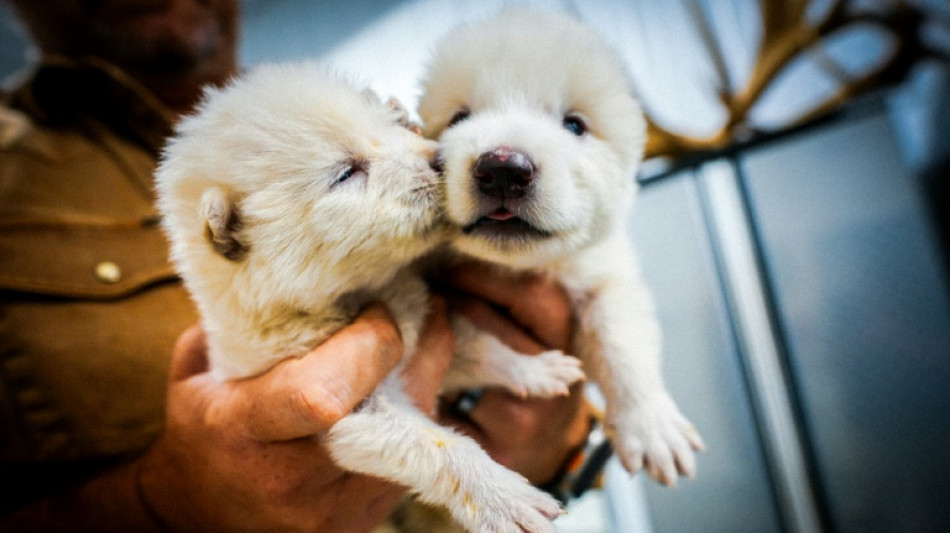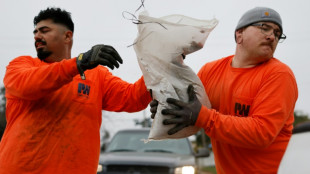
-
 Trump says comedian Colbert should be 'put to sleep'
Trump says comedian Colbert should be 'put to sleep'
-
Mahrez leads Algeria to AFCON cruise against Sudan

-
 Southern California braces for devastating Christmas storm
Southern California braces for devastating Christmas storm
-
Amorim wants Man Utd players to cover 'irreplaceable' Fernandes

-
 First Bond game in a decade hit by two-month delay
First Bond game in a decade hit by two-month delay
-
Brazil's imprisoned Bolsonaro hospitalized ahead of surgery

-
 Serbia court drops case against ex-minister over train station disaster
Serbia court drops case against ex-minister over train station disaster
-
Investors watching for Santa rally in thin pre-Christmas trade

-
 David Sacks: Trump's AI power broker
David Sacks: Trump's AI power broker
-
Delap and Estevao in line for Chelsea return against Aston Villa

-
 Why metal prices are soaring to record highs
Why metal prices are soaring to record highs
-
Stocks tepid in thin pre-Christmas trade

-
 UN experts slam US blockade on Venezuela
UN experts slam US blockade on Venezuela
-
Bethlehem celebrates first festive Christmas since Gaza war

-
 Set-piece weakness costing Liverpool dear, says Slot
Set-piece weakness costing Liverpool dear, says Slot
-
Two police killed in explosion in Moscow

-
 EU 'strongly condemns' US sanctions against five Europeans
EU 'strongly condemns' US sanctions against five Europeans
-
Arsenal's Kepa Arrizabalaga eager for more League Cup heroics against Che;sea

-
 Thailand-Cambodia border talks proceed after venue row
Thailand-Cambodia border talks proceed after venue row
-
Kosovo, Serbia 'need to normalise' relations: Kosovo PM to AFP

-
 Newcastle boss Howe takes no comfort from recent Man Utd record
Newcastle boss Howe takes no comfort from recent Man Utd record
-
Frank warns squad to be 'grown-up' as Spurs players get Christmas Day off

-
 Rome pushes Meta to allow other AIs on WhatsApp
Rome pushes Meta to allow other AIs on WhatsApp
-
Black box recovered from Libyan general's crashed plane

-
 Festive lights, security tight for Christmas in Damascus
Festive lights, security tight for Christmas in Damascus
-
Zelensky reveals US-Ukraine plan to end Russian war, key questions remain

-
 El Salvador defends mega-prison key to Trump deportations
El Salvador defends mega-prison key to Trump deportations
-
Stranger Things set for final bow: five things to know

-
 Grief, trauma weigh on survivors of catastrophic Hong Kong fire
Grief, trauma weigh on survivors of catastrophic Hong Kong fire
-
Asian markets mixed after US growth data fuels Wall St record

-
 Stokes says England player welfare his main priority
Stokes says England player welfare his main priority
-
Australia's Lyon determined to bounce back after surgery

-
 Stokes says England players' welfare his main priority
Stokes says England players' welfare his main priority
-
North Korean POWs in Ukraine seeking 'new life' in South

-
 Japanese golf star 'Jumbo' Ozaki dies aged 78
Japanese golf star 'Jumbo' Ozaki dies aged 78
-
Johnson, Castle shine as Spurs rout Thunder

-
 Thai border clashes hit tourism at Cambodia's Angkor temples
Thai border clashes hit tourism at Cambodia's Angkor temples
-
From predator to plate: Japan bear crisis sparks culinary craze

-
 Asian markets mostly up after US growth fuels Wall St record
Asian markets mostly up after US growth fuels Wall St record
-
'Happy milestone': Pakistan's historic brewery cheers export licence

-
 Chevron: the only foreign oil company left in Venezuela
Chevron: the only foreign oil company left in Venezuela
-
US denies visas to EU ex-commissioner, four others over tech rules

-
 SMX Is Being Valued By Monetizing Certainty, Not Sustainability Narratives
SMX Is Being Valued By Monetizing Certainty, Not Sustainability Narratives
-
SMX Is Earning Validation, and Valuation, Through Industrial Proof, Not Promises

-
 SMX's Valuation Is Anchored in Fixing a Structural Supply-Chain Failure Markets Learned to Ignore
SMX's Valuation Is Anchored in Fixing a Structural Supply-Chain Failure Markets Learned to Ignore
-
2026 Payer IT Outsourcing Outlook: Outcome-Based Managed Services, Production-Grade GenAI Governance, and Vendor-Risk Enforcement

-
 Gold's Quiet Molecular-Level Reckoning Is Happening Outside the Spotlight
Gold's Quiet Molecular-Level Reckoning Is Happening Outside the Spotlight
-
SMX Is Transitioning From Single Deployments to Supply-Chain Infrastructure

-
 Each SMX Partnership Opens a Market, the Portfolio Multiplies the Value
Each SMX Partnership Opens a Market, the Portfolio Multiplies the Value
-
CORRECTION: Nextech3D.ai Provides Shareholder Update on Krafty Labs Acquisition and Announces $321,917 CEO Investment


US firm says it brought back extinct dire wolves
They whimper, drink from baby bottles and crawl oh so tentatively -- they look like cute white puppies, not the fruit of a daring project to resuscitate an extinct species.
A Texas startup called Colossal Biosciences made a big splash this week by releasing footage of canines they say are dire wolves, a species that vanished more than 12,000 years ago.
"For the first time in human history, Colossal successfully restored a once-eradicated species through the science of de-extinction," the company states on its website.
Photos and video of these critters have flooded social media and shaken the scientific community, which has reacted with a mix of enthusiasm and skepticism over this experiment reminiscent of "Jurassic Park" -- the fictional story of a quirky rich man's attempt to bring back the dinosaurs.
The company says it did it by tweaking the DNA of a modern-day gray wolf with carefully chosen genes from dire wolf fossils. This modified genetic material was then inserted in a grey wolf egg and implanted in a common dog as a surrogate mom.
The result: three baby dire wolves, Colossal Biosciences claims.
"I think the claims are vastly overblown," Alan Cooper, an evolutionary molecular biologist who took part in a previous study of dire wolf DNA, told AFP.
"It would be like me putting a couple of genes into you from Neanderthals that made you extra hairy and grow more muscles, and then called you a Neanderthal," said Cooper.
"That's a million miles from Neanderthal. It's a hairy human."
"This is not the dire wolf. This is something they have created that has phenotypic characteristics of dire wolf,” said Lisette Waits, an ecologist and professor of wildlife resources at the University of Idaho.
Waits, who has worked extensively on grey wolf genetics and red wolf conservation issues, nonetheless called this achievement a breakthrough.
The pups are named Romulus and Remus, in a nod to the twin brothers of Roman mythology, and Khaleesi, of "Game of Thrones" fame.
- Debate -
The Colossal Biosciences team studied DNA from two dire wolf fossils -- a tooth from 13,000 years ago and a skull fragment dated back 72,000 years -- and compared them to the DNA of the gray wolf, a species that is alive and well.
The team concluded these two kinds of DNA are around 99.5 percent identical, Beth Shapiro, the company's chief science officer, told AFP.
An analysis of the differences between the two kinds of DNA determined which genes could be responsible for the dire wolf's size, muscle structure and its white fur.
With this information the team modified blood cells from a grey wolf by inserting some of those dire wolf genes. A total of 20 changes were made using the genetic manipulation technique known as Crispr-Cas 9, which is also used in human genetics.
The blood cells were then transferred to a gray wolf egg cell that was implanted in a dog. The results: Romulus, Remus and Khaleesi.
Whether these animals are actual dire wolves or simply genetically modified gray wolves, Shapiro insisted, "is a semantic, philosophical argument."
She added that it will never be possible to create an animal that is 100 percent genetically identical to a species that is extinct.
"But neither is that the goal. Our goal is to create functional equivalents of those species,” the scientist said.
- Dodos and wooly mammoths -
The company plans to apply this technique to dodo birds and woolly mammoths.
Just last month it released photos of mice injected with genetic material from one of those extinct pachyderms, yielding controversy and some very furry rodents.
Some scientists say the goal of recreating extinct species is unattainable and even dangerous. But others welcome it as an ambitious way to fight the planet's steady loss of biodiversity.
Waits, the conservation specialist, said that aside from the hoopla over this experiment this technique could help endangered species recover.
Colossal Biosciences has managed to lure more than $200 million in investment money, which would be a very tall task for other conservation causes, she added.
Ronald Sandler, a professor of philosophy and ethics at Northeastern University, said he worries this technique might lead to "moral distraction" away from the causes of animals going extinct, like climate change and habitat loss.
Th.Berger--AMWN


